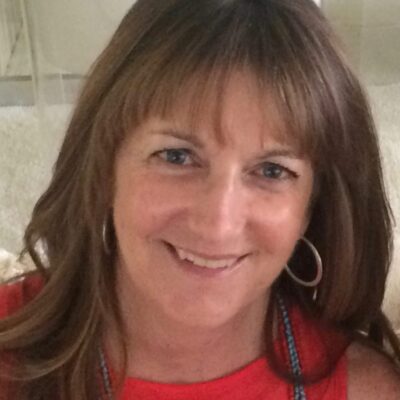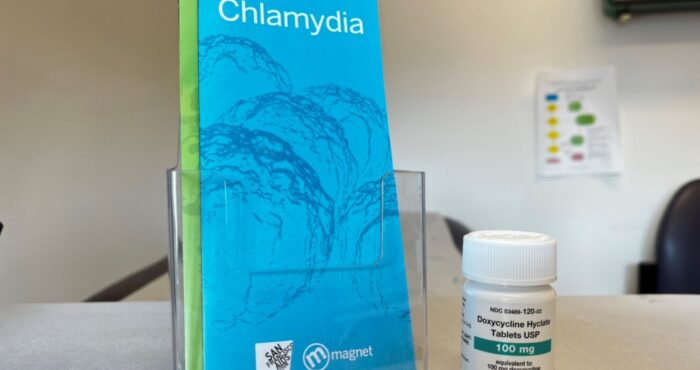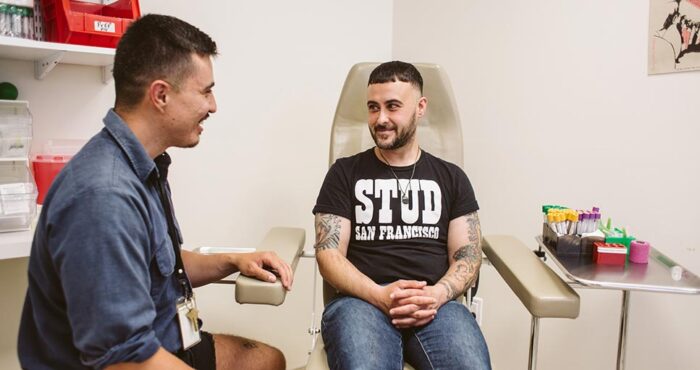What prevents people from accessing PEP in San Francisco?
PEP is available on a limited basis at San Francisco AIDS Foundation during the COVID-19 shelter-in-place. If you have had a recent HIV exposure, please call 415-581-1600 and select option #3 to be connected with the nursing team at Magnet. They will be able to coordinate services and testing for you.
HIV-negative people who may have been exposed to HIV have long faced obstacles in gaining timely access to prevention drugs known as PEP, which must be started soon after exposure to reduce the risk of HIV infection. A new California law could greatly expand PEP access by allowing people to obtain the medication from pharmacies without first seeing a doctor, but COVID-19 and other concerns could delay its implementation.
This year, California became the first state in the nation to make HIV-prevention drugs available without a prescription. Under SB 159, which became law on Jan. 1, 2020 and was co-sponsored by San Francisco AIDS Foundation, pharmacists who undergo special training will be able to independently furnish HIV-prevention medications to patients.
But the planned July implementation of the new law will likely be delayed because the California State Board of Pharmacy has not yet developed nor approved a training course and the COVID-19 pandemic further complicates the timeline.
PEP, or post-exposure prophylaxis, is a month-long treatment of antiretroviral medications for people who have possibly been exposed to HIV. If started within 72 hours of a possible HIV exposure (and ideally, as soon as possible), PEP can prevent a person from becoming HIV-positive. Anyone can take PEP, including people who use injection drugs, men who have sex with men, women and trans people.
However, there have long been barriers to acquiring PEP medications including inequities in health care access, affordability and awareness that this prevention tool even exists.
Up until now, a person seeking PEP must consult a medical provider, take an HIV test and, if the results are negative, obtain a prescription before going to the pharmacy to get the medication. Navigating this time-sensitive and time-consuming process is particularly difficult for uninsured or low-income people who can’t take time off from their jobs.
During regular office hours during the work week, people in San Francisco can seek PEP from their own medical providers or they can call the San Francisco Department of Public Health’s City Clinic for an assessment, a lab request for an HIV test, a two-day supply of medication and a prescription for the remaining doses as well as access to financial assistance programs.
But during nights and weekends when people are more likely to need PEP, there are fewer options. Insured people can go to urgent care centers, while those without coverage can go to hospital emergency departments as a last resort. Magnet, the sexual health clinic of San Francisco AIDS Foundation is open on Saturdays, in addition to weekdays, and prioritizes uninsured patients, covering the costs of lab work and medical visits on a limited basis based on capacity.
Reina Hernandez, PrEP and HIV benefits and navigation manager at San Francisco AIDS Foundation, said the clinic also works to enroll uninsured clients in Gilead Sciences’ Patient Assistance Program so they can receive PEP treatment at no cost. They also help clients obtain lower-priced medications from the state’s AIDS Drug Assistance Program (ADAP).
A major barrier for people living in an expensive city like San Francisco, according to Hernandez, are income limits. To qualify for ADAP, for example, people must make below 500 percent of the federal poverty level ($63,000).
“Anyone regardless of income should be able to get PEP,” Hernandez said. “We have the technology and resources to prevent HIV and we should be able to use them despite a person’s income.”
SB 159 allows pharmacists to provide a full 28-day course of PEP drugs as well as up to a 60-day supply of drugs used for PrEP, or pre-exposure prophylaxis, without a prescription.
Montica Levy, the biomedical HIV prevention coordinator at City Clinic, said she is excited for the new law to be put into action because it will make it easier to get PEP through a single stop at the pharmacy.
“It will cut down on the steps in the process,” she said. “My hope is that there will be a pharmacy in every neighborhood dispensing PEP.”
The new law removes a previous obstacle to obtaining PEP—the requirement of some insurance companies that people obtain preauthorization.
Christina Garcia, the CEO and founder of TIN Rx, a pharmacy that caters to the LGBTQ community, said her biggest concerns have been about timely insurance coverage and the affordability of PEP and PrEP medication, particularly for younger members of minority groups and people on fixed incomes.
“TIN Rx will be one of the first pharmacies to push SB 159,” she says. “We will provide testing on site.”
To take full advantage of the new law, Hernandez said social barriers must be overcome that make access to PEP more difficult for marginalized and underserved populations including people of color, transgender people and undocumented immigrants.
Another issue, they said, is that people seeking PEP are sometimes criticized for not acting before a potential exposure by being on PrEP.
“PrEP doesn’t work for everyone either because of financial barriers, or health issues or adherence,” said Hernandez.
Further complicating the ability of people to prevent HIV after a potential exposure is a lack of widespread awareness that PEP is available on an emergency basis.
Hernandez said that compared to PrEP, not enough educational outreach is being done to get the word out about the availability of PEP.
“PEP availability is not common knowledge,” they said. “It goes back to social barriers and the lack of comprehensive sexual health education in this country.”
“We do our best to get the word out, but find many people are not familiar with PEP,” agreed Levy of San Francisco Department of Public Health.
Levy said help may be on the way to solve the affordability problem. She said she expects the price of Truvada—a drug used as one component of PEP and for PrEP—to come down next year, six months after the drug goes generic in October 2020 and exclusivity expires for the first generic manufacturers. That could make it easier for clinics to get supplies and distribute more widely to vulnerable populations.
SB 159 also allows patients to waive an HIV test if they are otherwise eligible for PEP.
Anne Nelson, the lead specialty pharmacist at the delivery-based Alto Pharmacy, said that provision will make it faster for patients to get on PEP in an emergency by allowing a telemedicine conversation and immediate shipment of these life-saving medications—a particular advantage to people in rural areas outside of San Francisco.
Pharmacists like Nelson and Garcia agree that dealing directly with them will eliminate the stigma that some patients feel when providing personal information to their medical providers. But the question remains whether chain pharmacies will join the smaller independents in providing PEP directly to patients who are fearful following possible exposure to HIV.
“I hope and pray that most pharmacies will have the heart and compassion to take care of these patients,” said Garcia of TinRX.










